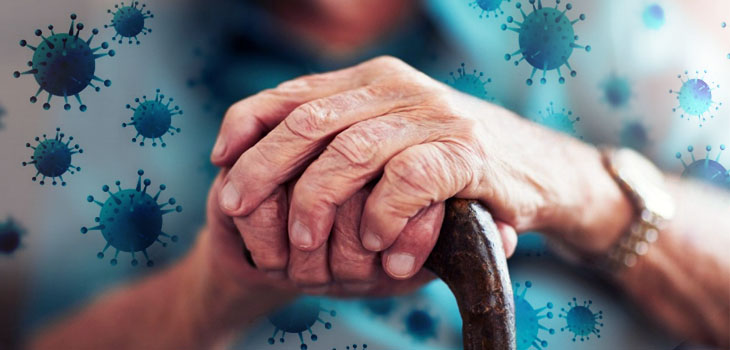
In 2019, a new virus hit the world scene and is spreading rapidly, a novel Corona virus responsible for the respiratory disease COVID-19.
And in 2020, the World Health Organization (WHO) trusted Source declared the global outbreak of COVID-19a “public health emergency of international concern’’
Elderly people are at a higher risk of COVID-19 infection due to their decreased immunity and body reserves, as well as multiple associated comorbidities like diabetes, hypertension, chronic kidney disease and chronic obstructive pulmonary disease. Also, course of disease tends to be more severe in case of elderly patients resulting in higher mortality.
WHAT IS CORONA VIRUS ?
Corona virus disease 2019 (COVID-19) is defined as illness caused by a novel corona virus now called SEVERE ACUTE RESPIRATORY SYNDROME Corona virus 2 (SARS-CoV-2; formerly called 2019-nCoV), which was first identified amid an outbreak of respiratory illness cases in Wuhan City, Hubei Province, China. They are a family of viruses that circulate in both humans and animals and can cause everything from the common cold to more serious respiratory illnesses.
RISK FACTORS IN ELDERLY PATIENTS
- People 65 yrs and older
- People who live in a nursing home or long-term care facility
- People with chronic lung disease or moderate to severe asthma
- People who have serious heart conditions
- People who are immunocompromised -on cancer treatment, smoking, bone marrow or organ transplantation, immune deficiencies, poorly controlled HIV or AIDS, and prolonged use of corticosteroids and other immune weakening medications
- People with severe obesity (body mass index [BMI] of 40 or higher)
- People with diabetes
- People with chronic kidney disease undergoing dialysis, Chronic liver disease
MODE OF TRANSMISSION
- Mainly spreads through droplets of saliva or discharge from the nose when an infected person coughs or sneezes
- Close contact with an infected person in poorly ventilated rooms
- Touching or shaking contaminated hands
- Touching an object or surface with the virus on it and then touching mouth, nose or eyes before washing hands
SYMPTOMS AND SIGNS
Symptoms may appear 2-14 days after exposure to the virus.
- Mild flu like symptoms-Dry cough, Fever, Sore throat, runny nose, fatigue, Headache, nausea, diarrhoea, loss of taste and smell,repeated chills with shaking, severe body pains
- Confusion, drowsiness, disorientation, excess sleepiness
- Moderate to severe symptoms- Shortness of breath, Pneumonia, Happy or silent hypoxia
- Severe Acute Respiratory Distress Syndrome (SARS), Sepsis, Multi-organ failure, death.
WARNING SIGNS
- Trouble breathing
- Persistent pain or pressure in the chest
- New confusion
- Inability to wake or stay awake
- Bluish lips or face
INVESTIGATIONS
Recommended tests include RT PCR analysis of Nasopharyngeal or throat swabs
WHAT TO DO IN A CONFIRMED COVID 19 ELDERLY PATIENT
- Wear a mask, practice hand hygiene and take paracetamol for fever (avoid Ibuprofen).
- Take your regular medications
- Pay attention for potential COVID-19 symptoms like fever, cough, and shortness of breath or warning signs mentioned above. If any immediately seek medical care
Health Advisory for Elderly Population of India during COVID19
DO’s
- Stay at home. Avoid meeting visitors at home. If meeting is essential, maintain a distance of one meter.
- Wash your hands and face at regular intervals with soap and water.
- Sneeze and cough either into your elbow or into tissue paper / handkerchief . After coughing or sneezing dispose of the tissue paper/ wash your handkerchief.
- Ensure proper nutrition through home cooked fresh hot meals, hydrate frequently and take fresh juices to boost immunity.
- Exercise and meditate.
- Take your daily prescribed medicines regularly.
- Talk to your family members (not staying with you), relatives, friends via call or video conferencing, take help from family members if needed
- Postpone your elective surgeries (if any) like cataract surgery or total knee replacement
- Clean the frequently touched surfaces with disinfectant regularly.
- Monitor your health. If you develop fever, cough and/or breathing difficulty immediately contact nearest health care facility and follow the medical advice
DON’Ts
- Do not cough or sneeze into your bare hands or without covering your face.
- Don’t go near your contacts if you are suffering from fever and cough.
- Don’t touch your eyes, face, nose and tongue.
- Don’t go near affected/ sick people .
- Don’t self-medicate.
- Don’t shake hands or hug your friends and near ones.
- Do not go to hospital for routine checkup or follow up.
As far as possible make tele-consultation with your healthcare provider. - Don’t go to crowded places like parks, markets and religious places.
- Don’t go out unless it is absolutely essential.
What others can do to support older adults?
Older people can be helped to feel more positive if they engage with the world and stay active. Don’t lock them up and try to protect them. Make sure they are not immobile for long periods of time, watching television for long periods or remaining bed bound.
- Identify an emergency contact and keep the number on speed dial of the phone and also visibly displayed at home.
- Identify a caregiver in family or any community volunteer or police to help elderly by providing them essential supplies and keep a watch on general wellbeing of the elderly esp. who are staying alone. Also determine who can care for them if their caregiver gets sick.
- Provide psychosocial support.
Dr.M.Rose Raichel, MBBS, DNB(INT.MED),F.Diab
Consultant Physician and Diabetologist
Mehta Hospital Global campus, Velappanchavadi
